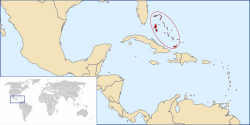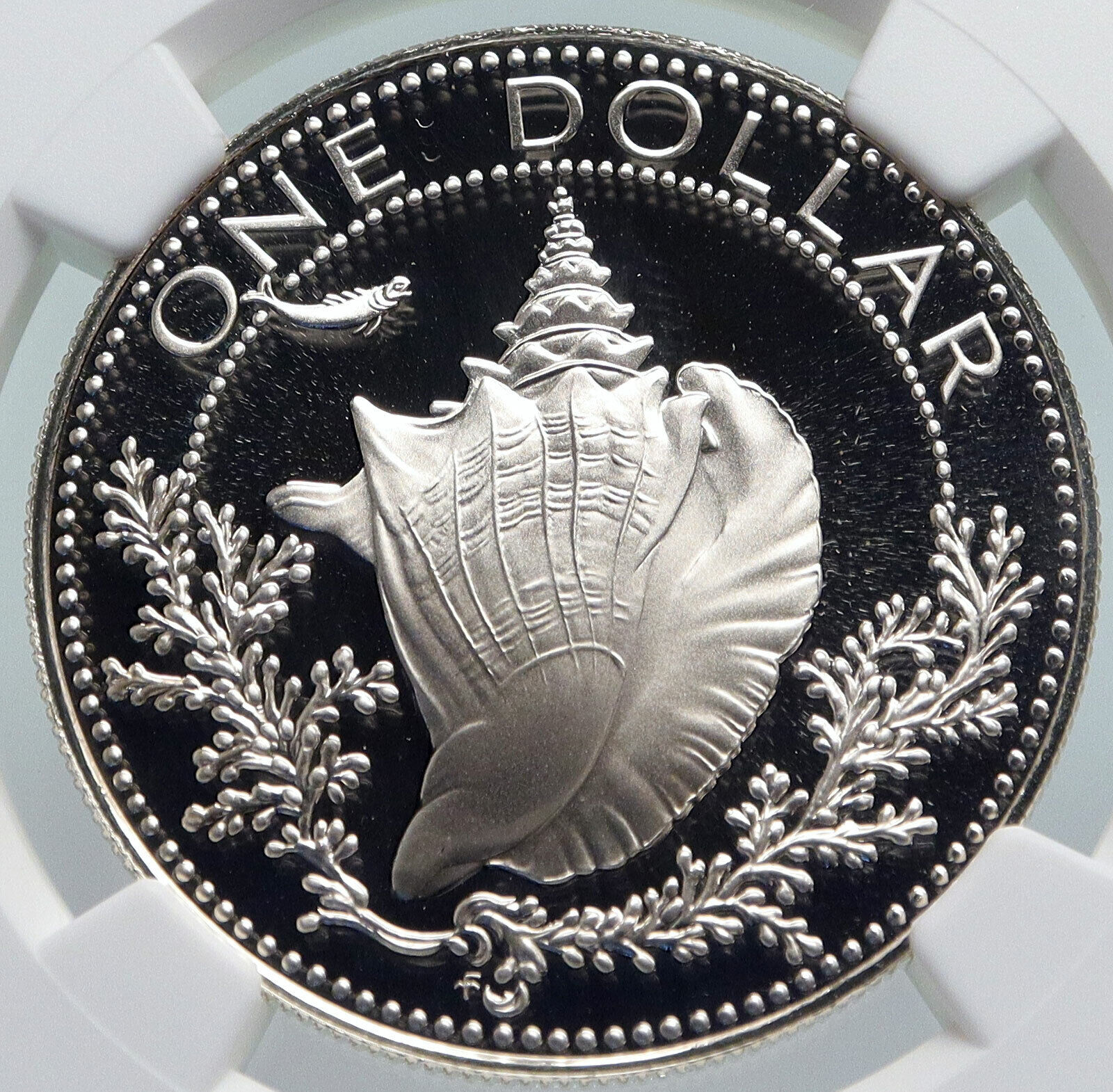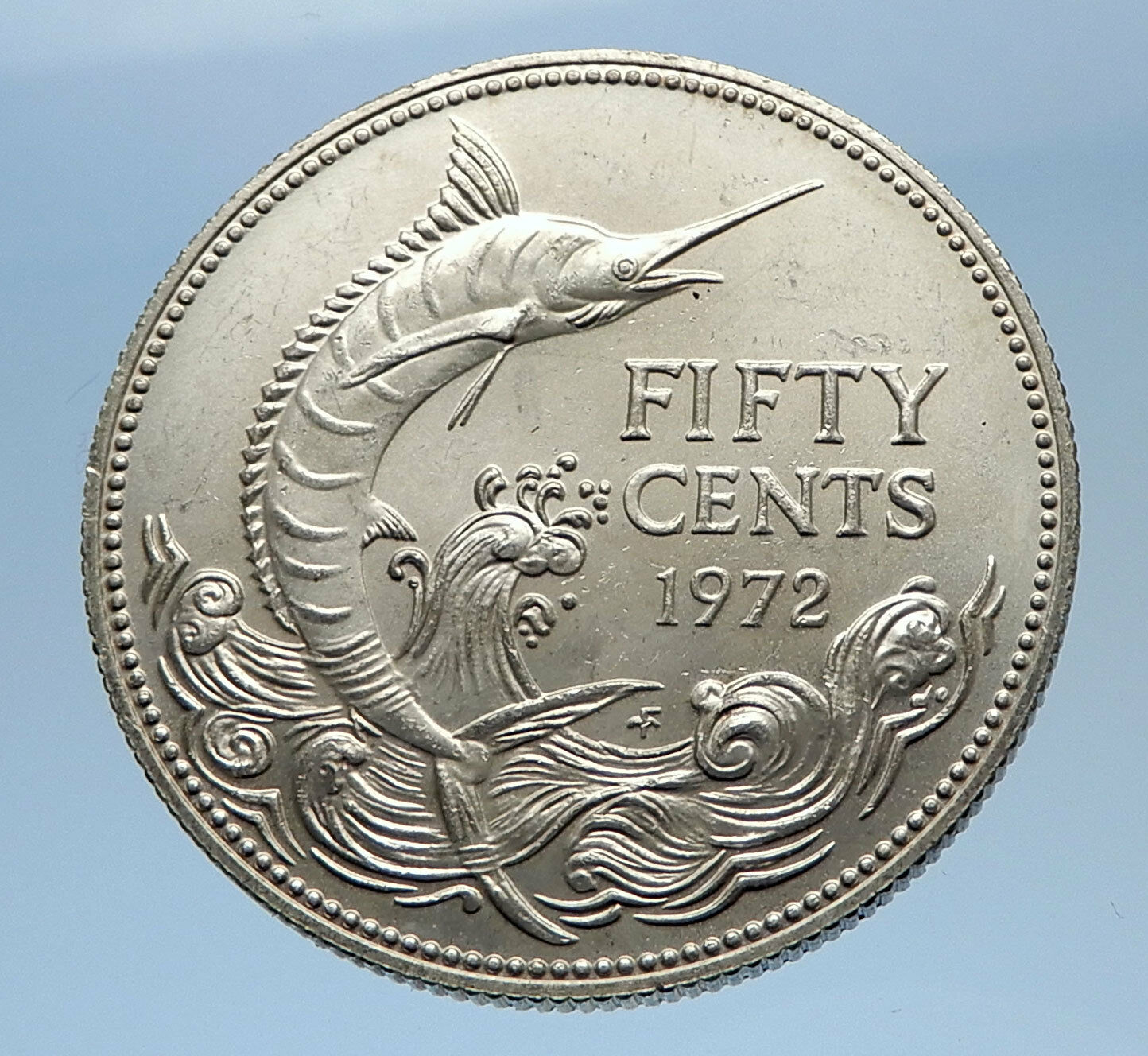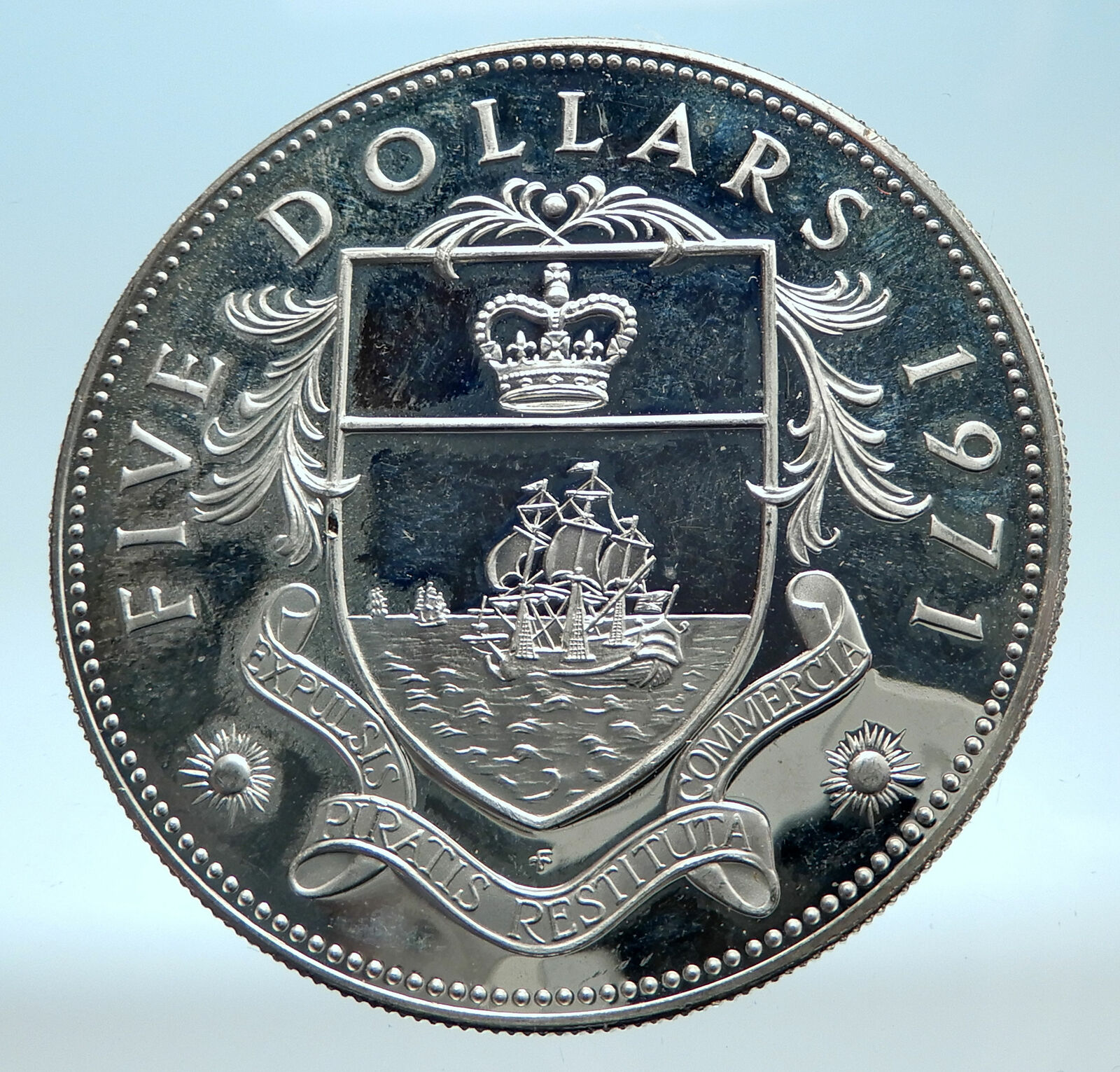|
Bahamas
5th Anniversary of Independence
1978 Proof Silver 10 Dollars 50.00mm (45.36 grams)
0.500 Silver (0.7292 oz. ASW)
Reference: KM# 78, Schön# 52 | Engraver:
Michael Hibbit
Certification: NGC PF 67 ULTRA CAMEO 2864290-007
COMMONWEALTH OF THE BAHAMAS FORWARD UPWARD ONWARD TOGETHER 1978, The arms and
motto of the Bahamas with the date below.
FIFTH ANNIVERSARY OF INDEPENDENCE 10 JULY 1973 H.R.H. PRINCE CHARLES TEN
DOLLARS, The bust of Prince Charles facing right.
You are bidding on the exact item pictured, provided with a Certificate of Authenticity and Lifetime Guarantee of Authenticity.
 Charles, Prince of Wales (Charles Philip Arthur George; born 14 November 1948) is the heir apparent to the British throne as the eldest son of Queen Elizabeth II. He has been heir apparent as well as Duke of Cornwall and Duke of Rothesay since 1952 and is both the oldest and the longest-serving heir apparent in British history. He is also the longest-serving Prince of Wales, having held the title since July 1958. Upon the death of his father, Prince Philip, on 9 April 2021, Charles also inherited the title of Duke of Edinburgh. Charles, Prince of Wales (Charles Philip Arthur George; born 14 November 1948) is the heir apparent to the British throne as the eldest son of Queen Elizabeth II. He has been heir apparent as well as Duke of Cornwall and Duke of Rothesay since 1952 and is both the oldest and the longest-serving heir apparent in British history. He is also the longest-serving Prince of Wales, having held the title since July 1958. Upon the death of his father, Prince Philip, on 9 April 2021, Charles also inherited the title of Duke of Edinburgh.
Charles was born in Buckingham Palace as the first grandchild of King George VI and Queen Elizabeth. He was educated at Cheam and Gordonstoun schools, both of which his father attended as a child. He later spent a year at the Timbertop campus of Geelong Grammar School in Victoria, Australia. After earning a Bachelor of Arts degree from the University of Cambridge, Charles served in the Royal Air Force and Royal Navy from 1971 to 1976. In 1981, he married Lady Diana Spencer, with whom he had two sons: William and Harry. In 1996, the couple divorced following well-publicised extramarital affairs by both parties. Diana died as the result of a car crash in Paris the following year. In 2005, Charles married his long-term partner Camilla Parker Bowles.
As the Prince of Wales, Charles undertakes official duties on behalf of the Queen. He founded The Prince’s Trust in 1976, sponsors The Prince’s Charities, and is a patron, president, or a member of over 400 other charities and organisations. As a self-described environmentalist, Charles has spoken publicly about issues such as organic farming and climate change, which has earned him awards and recognition from environmental groups. His support for alternative medicine, including homeopathy, has been the subject of criticism. His views on the role of architecture in society and the conservation of historic buildings have received significant attention from British architects and design critics. Since 1993, Charles has worked on the creation of Poundbury, an experimental new town based on his architectural tastes. He is also an author or co-author of a number of books.
  The Bahamas, officially the Commonwealth of the Bahamas, is an archipelagic state of the Lucayan Archipelago consisting of more than 700 islands, cays, and islets in the Atlantic Ocean; north of Cuba and Hispaniola (Haiti and the Dominican Republic); northwest of the Turks and Caicos Islands; southeast of the US state of Florida and east of the Florida Keys. Its capital is Nassau on the island of New Providence. The designation of “The Bahamas” can refer to either the country or the larger island chain that it shares with the Turks and Caicos Islands. As stated in the mandate/manifesto of the Royal Bahamas Defence Force, the Bahamas territory encompasses 470,000 km2 (180,000 sq mi) of ocean space. The Bahamas, officially the Commonwealth of the Bahamas, is an archipelagic state of the Lucayan Archipelago consisting of more than 700 islands, cays, and islets in the Atlantic Ocean; north of Cuba and Hispaniola (Haiti and the Dominican Republic); northwest of the Turks and Caicos Islands; southeast of the US state of Florida and east of the Florida Keys. Its capital is Nassau on the island of New Providence. The designation of “The Bahamas” can refer to either the country or the larger island chain that it shares with the Turks and Caicos Islands. As stated in the mandate/manifesto of the Royal Bahamas Defence Force, the Bahamas territory encompasses 470,000 km2 (180,000 sq mi) of ocean space.
 The Bahamas were the site of Columbus’ first landfall in the New World in 1492. At that time, the islands were inhabited by the Lucayan, a branch of the Arawakan-speaking Taino people. Although the Spanish never colonised the Bahamas, they shipped the native Lucayans to slavery in Hispaniola. The islands were mostly deserted from 1513 until 1648, when English colonists from Bermuda settled on the island of Eleuthera. The Bahamas were the site of Columbus’ first landfall in the New World in 1492. At that time, the islands were inhabited by the Lucayan, a branch of the Arawakan-speaking Taino people. Although the Spanish never colonised the Bahamas, they shipped the native Lucayans to slavery in Hispaniola. The islands were mostly deserted from 1513 until 1648, when English colonists from Bermuda settled on the island of Eleuthera.
The Bahamas became a British Crown colony in 1718, when the British clamped down on piracy. After the American War of Independence, the Crown resettled thousands of American Loyalists in the Bahamas; they brought their slaves with them and established plantations on land grants. Africans constituted the majority of the population from this period. The Bahamas became a haven for freed African slaves: the Royal Navy resettled Africans here liberated from illegal slave ships; American slaves and Seminoles escaped here from Florida; and the government freed American slaves carried on United States domestic ships that had reached the Bahamas due to weather. Slavery in the Bahamas was abolished in 1834. Today the descendants of slaves and free Africans make up nearly 90% of the population; issues related to the slavery years are part of society.
The Bahamas became an independent Commonwealth realm in 1973, retaining Queen Elizabeth II as its monarch. In terms of gross domestic product per capita, the Bahamas is one of the richest countries in the Americas (following the United States and Canada). Its economy is based on tourism and finance.
|









 Charles, Prince of Wales (Charles Philip Arthur George; born 14 November 1948) is the heir apparent to the British throne as the eldest son of Queen Elizabeth II. He has been heir apparent as well as Duke of Cornwall and Duke of Rothesay since 1952 and is both the oldest and the longest-serving heir apparent in British history. He is also the longest-serving Prince of Wales, having held the title since July 1958. Upon the death of his father, Prince Philip, on 9 April 2021, Charles also inherited the title of Duke of Edinburgh.
Charles, Prince of Wales (Charles Philip Arthur George; born 14 November 1948) is the heir apparent to the British throne as the eldest son of Queen Elizabeth II. He has been heir apparent as well as Duke of Cornwall and Duke of Rothesay since 1952 and is both the oldest and the longest-serving heir apparent in British history. He is also the longest-serving Prince of Wales, having held the title since July 1958. Upon the death of his father, Prince Philip, on 9 April 2021, Charles also inherited the title of Duke of Edinburgh.
 The Bahamas, officially the Commonwealth of the Bahamas, is an archipelagic state of the Lucayan Archipelago consisting of more than 700 islands, cays, and islets in the Atlantic Ocean; north of Cuba and Hispaniola (Haiti and the Dominican Republic); northwest of the Turks and Caicos Islands; southeast of the US state of Florida and east of the Florida Keys. Its capital is Nassau on the island of New Providence. The designation of “The Bahamas” can refer to either the country or the larger island chain that it shares with the Turks and Caicos Islands. As stated in the mandate/manifesto of the Royal Bahamas Defence Force, the Bahamas territory encompasses 470,000 km2 (180,000 sq mi) of ocean space.
The Bahamas, officially the Commonwealth of the Bahamas, is an archipelagic state of the Lucayan Archipelago consisting of more than 700 islands, cays, and islets in the Atlantic Ocean; north of Cuba and Hispaniola (Haiti and the Dominican Republic); northwest of the Turks and Caicos Islands; southeast of the US state of Florida and east of the Florida Keys. Its capital is Nassau on the island of New Providence. The designation of “The Bahamas” can refer to either the country or the larger island chain that it shares with the Turks and Caicos Islands. As stated in the mandate/manifesto of the Royal Bahamas Defence Force, the Bahamas territory encompasses 470,000 km2 (180,000 sq mi) of ocean space. The Bahamas were the site of Columbus’ first landfall in the New World in 1492. At that time, the islands were inhabited by the Lucayan, a branch of the Arawakan-speaking Taino people. Although the Spanish never colonised the Bahamas, they shipped the native Lucayans to slavery in Hispaniola. The islands were mostly deserted from 1513 until 1648, when English colonists from Bermuda settled on the island of Eleuthera.
The Bahamas were the site of Columbus’ first landfall in the New World in 1492. At that time, the islands were inhabited by the Lucayan, a branch of the Arawakan-speaking Taino people. Although the Spanish never colonised the Bahamas, they shipped the native Lucayans to slavery in Hispaniola. The islands were mostly deserted from 1513 until 1648, when English colonists from Bermuda settled on the island of Eleuthera.




